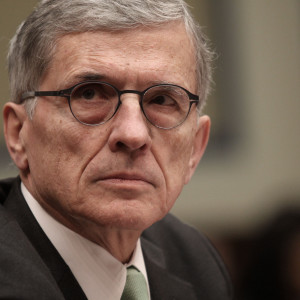After being forced to abandon major regulatory shakeups in the cable box and business internet markets, the aggressive Federal Communications Commission of the last three years headed by Democratic Chairman Tom Wheeler may make one last play to influence how net neutrality is regulated. Key issues like free data and traffic prioritization may yet face decisions before Wheeler’s landmark tenure transitions to a Republican chosen by anti-net neutrality President-elect Donald Trump next year.
Last week, Wheeler said rules to force pay-TV providers to offer their content on free apps instead of requiring set-top boxes, along with price caps on high-capacity broadband service for ATMs, cell towers, public services, and businesses, likely won’t be addressed before the next chairman takes over, but Wheeler stayed relatively silent on the agency’s ongoing probe into zero-rating.
The chairman promised a close examination last year of the practice by T-Mobile, AT&T, Verizon, Sprint, and others of exempting certain content from subscribers’ monthly data caps. Pro-net neutrality advocates, like Public Knowledge, argue these offerings violate net neutrality tenets by giving an advantage to edge providers partnered with the internet providers.
The FCC said little on the subject in the year since announcing the probe. That changed the day after Donald Trump’s election to the White House when the head of the FCC’s wireless division, Jon Wilkins, wrote to AT&T’s head of external and legislative affairs, Robert Quinn, “to express serious concerns about the impact of AT&T Mobility’s ‘Sponsored Data.'”
“Based on public reports as well as information you have provided to us, the Wireless Telecommunications Bureau believes that the terms and conditions under which Sponsored Data is offered to content providers unaffiliated with AT&T, combined with
AT&T’s current practice of zero-rating DIRECTV video applications for AT&T Mobility subscribers, may obstruct competition and harm consumers by constraining their ability to access existing and future mobile video services not affiliated with AT&T,” Wilkins wrote.
Zero-rating video content from DirecTV and Time Warner is a key part of AT&T’s proposed strategy to buy the latter for $85.4 billion — a merger that could mean unlimited streaming of major television and box office brands like Warner Bros. and HBO for AT&T subscribers.
A source at AT&T told InsideSources the company interpreted the letter as a possible last-minute push by the Obama administration’s FCC to push out regulatory actions before Republicans assume control of the agency for the next four years.
That push gained momentum Friday when congressional Democrats including pro-consumer heavy hitters Sens. Bernie Sanders of Vermont and Elizabeth Warren of Massachusetts, both of whom oppose the merger, sent a letter to the FCC urging Wheeler to consider several forms of zero-rating “a violation of net neutrality.”
“Without proper oversight and enforcement action, zero-rating can discriminate against certain services, potentially distorting competition, stifling innovation and hampering user choice and free speech,” they wrote alongside Sens. Ron Wyden of Oregon, Al Franken of Minnesota, Tammy Baldwin of Wisconsin and FCC hawks Ed Markey of Massachusetts and Richard Blumenthal of Connecticut.
“When [internet service providers], not the consumer, choose online winners and losers, the very core tenets of net neutrality could be disrupted,” the letter reads. “We call on the commission to take enforcement action against harmful zero-rating offerings that violate the principles of the Open Internet Order.”
Quinn responded to Wilkins letter saying AT&T will let any edge provider interested in sponsoring its data do so for the lowest wholesale price, but according to the FCC that doesn’t alleviate competitors, since it costs the wireless carrier nothing to zero-rate itself while payments from third-parties could become a high-cost burden just to level the playing field.
“Indeed, it is not difficult to calculate usage scenarios in which an unaffiliated provider’s Sponsored Data charges alone could render infeasible any third-party competitor’s attempt to compete with the $35 per month retail price that AT&T has announced for DIRECTV Now,” Wilkins said referring to the deal set to launch in late November, which will let AT&T subscribers stream unlimited DirecTV video on their handsets.
The letter gave AT&T until Monday to officially respond, though the deadline went out before Republican leaders charged with overseeing the FCC on both sides of the Capitol warned Wheeler against adopting any “controversial” proposals during the transition.
The warning was largely interpreted to target major regulatory overhauls like set-top boxes and business data services, meaning an enforcement action on zero-rating, which the agency previously said it would judge on a case-by-case basis, isn’t out of the question.
“Data Free TV is certainly not free to AT&T,” the company wrote back to the FCC Monday. “As more and more consumers discover the benefits of that service, AT&T will see escalating usage on its mobile network, where video already accounts for a clear majority of traffic. AT&T will need to respond to those new usage demands by making capital-intensive investments, which will add to the billions AT&T has already spent to keep up with skyrocketing mobile video usage.”
AT&T argued the program complies with the law and that any enforcement action would require the FCC to hold “a rulemaking proceeding after notice and comment.”
“I am confident the attached analysis will adequately alleviate the concerns you outlined in your November 9th letter,” Quinn wrote Monday. “We are extremely bullish on the pro-consumer benefits of sponsored data.”

